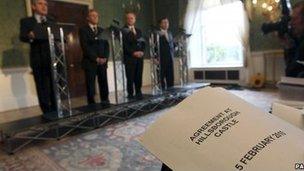Proposal made to cut Stormont executive ministry
- Published

The deal agreed at Hillsborough in 2010 runs out next May
Northern Ireland's first minister and deputy first minister have said one of the Stormont executive's departments should be abolished.
They have proposed that the Department for Employment and Learning (DEL) should go with its powers being divided between education and enterprise.
This follows multi-party discussions at Stormont Castle.
It was also proposed that the cross-community vote which elects David Ford as justice minister should be extended.
His appointment runs out at the end of April.
Alliance Party leader David Ford criticised the plans to abolish the Department for Employment and Learning without looking at other areas of government.
The post is currently held by Alliance's Stephen Farry.
Mr Ford said his party was not against a reduction in the number of assembly departments but said there was a need for a single strong department of the economy.
"We see what is apparently a carve-up, a fix to transfer some DEL functions to a Sinn Fein-controlled department in education and some to a DUP-controlled department in department of trade and investment," he said.
"That looks to me, not just as potentially seen as malicious towards the Alliance Party but is actually extremely bad government, not to keep the economy departments together but to further fragment them when we should be moving towards move streamlined government," he said.
"It's hardly because Stephen Farry hasn't been a good minister because in terms of tackling difficult issues like tuition fees or the future of teacher training, Stephen has shown that he's prepared to be a good hardworking minister so it's not because he's been a failure. There has to be some other reason."
The scrapping of the Department for Employment and Learning was raised with Mr Ford by First Minister Peter Robinson.
Mr Robinson said there was not one proposition that all the parties were prepared to sign up to.
"There are elements of the proposal that we have put forward which will be less difficult for some parties than the original proposition and of course for one party it will not be as sweet as the existing proposition," he said.
"However we believe it is our best attempt at trying to get the highest level of consensus and to move forward on a robust basis, so I think we have got a very workable proposal."
Mr McGuinness said the office of the first and deputy first minister was committed to tackling "the size of the assembly and the number of departments".
"The whole issue of d'Hondt will be considered in the course of our deliberations through 2012 and we've committed to getting a resolution to that," he said.
"This decision is a very decisive decision, it's about leadership in the absence of consensus and it's about moving forward in a way that gives confidence to people, that the work of policing and justice is not in any way going to be damaged or interrupted."
SDLP Environment Minister Alex Attwood said the proposal was a "missed opportunity".
"The SDLP argued that d'Hondt and only d'Hondt should be the standard for distribution of ministerial office," he said.
"The DUP and Sinn Fein have also decided, with the stroke of a pen, to do away with a government department. As with d'Hondt, both again demonstrate a fast and loose approach to government, deciding in a blink of an eye which departments stay or go.
"This decision, taken without proper interrogation and consideration, looks arbitrary and political."
Under the proposals, responsibility for universities would be given to the education minister, with job centres and other powers going to the enterprise department.
This would give more power to a Sinn Fein minister, John O'Dowd, and a DUP minister, Arlene Foster.
- Published10 January 2012
- Published8 November 2011
- Published9 November 2011